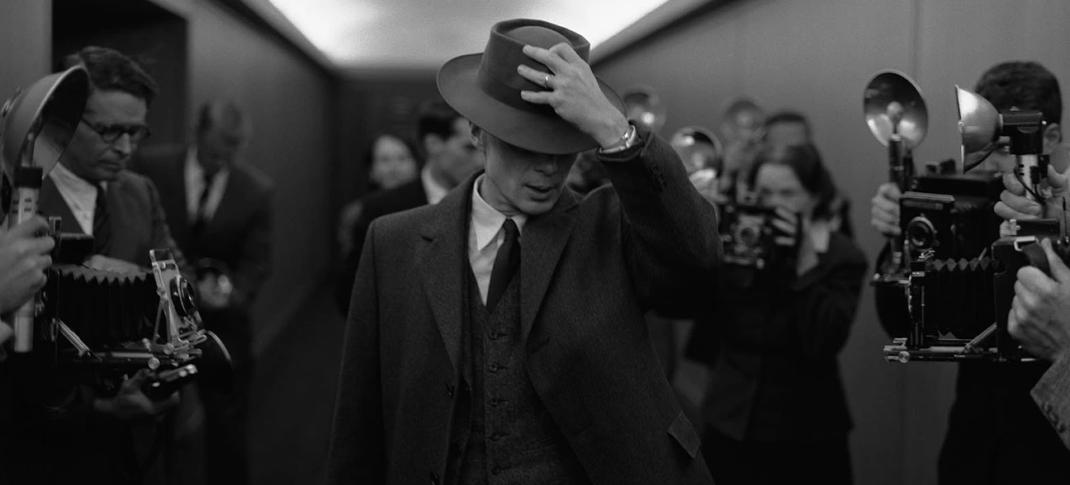What To Know About the Actors Strike & How It Affects British TV

Cillian Murphy as Oppenheimer in a publicity still from the film
On July 14, 2023, seventy-four days into the WGA strike, the Screen Actors Guild - American Federation of Television and Radio Artists joined the picket line. The original contract between SAG-AFTRA and the Alliance of Motion Picture and Television Producers (AMPTP) expired on Friday, June 30, at 11:59 p.m., but a two-week extension took the deadline to July 12, and a public vote by the SAG board on July 13 pushed the joint strike to begin at the end of the week. However, with talks at a dead standstill and acrimonious feelings on both sides, it seems like the joint strike will shut down Hollywood for the rest of the summer.
For those curious about the issues at play, we have a bullet point rundown below, but the real question for Anglophiles is how it will affect our beloved British shows. With the writers’ strike, WGGB (Writers Guild of Great Britain) was immediately vocal about its full support, and members who cross over to the WGA have refused to work on any shows that fall under that jurisdiction. Equity U.K., the British SAG-AFTRA equivalent, has been equally vocal in its support.
"Equity U.K. stands in unwavering solidarity with SAG-AFTRA and its members in their effort to achieve a fair and equitable contract, and for the good of performers working around the world. Equity U.K. will support SAG-AFTRA and its members by all lawful means."
However, that wording is specific and necessary, as U.K. industrial relations legislation, which under Tory rule and Brexit has become extraordinarily anti-trade union, does not recognize the SAG-AFTRA strike as lawful. “Consequently, a performer joining the strike (or refusing to cross a picket line) in the U.K. will have no protection against being dismissed or sued for breach of contract by the producer or the engager. Likewise, if Equity encourages anyone to join the strike or not cross a picket line, Equity itself will be acting unlawfully and hence liable for damages or an injunction.”
So while American productions will be shut down, with those productions still filming despite the WGA strike now shuttered, in the U.K., things will continue. As has been reported, the Game of Thrones prequel, House of the Dragon, a mainly British cast working in the U.K. under Equity U.K. contracts, will continue production (albeit without writers on set). The same goes for Industry, a BBC series that is an HBO co-production but is almost exclusively cast with British actors. Dune: The Sisterhood is another mainly British-casted series that can continue filming on the continent due to this loophole.
Once again, that means Anglophiles will not be deprived of their shows. This is also true in Australia, where a few American-led productions filming will shutter, but the local productions will continue as expected. Moreover, British shows on PBS and streaming are delayed arrivals due to exclusivity windows worked into the basic contracts. For example, Unforgotten Season 5 and Van der Valk Season 3 already aired in the U.K., so there will be no delay in those September debuts. Though World on Fire and Annika Season 2 have not aired in the U.K. yet, both have completed filming, are gearing up to premiere in the next few weeks, and will come over in October as announced.
And while they are the problem, the current methodology of streaming services like Netflix, Amazon, and Apple TV+ is to film entire seasons over a year in advance, as viewers saw in 2020, which made Netflix rather pandemic-proof during a time when linear TV was shut down. That also makes it immune to the strike, at least for the next few months, and with British productions not shut down, others may turn to bring over new-to-American series to fill gaps.
SAG-AFTRA Strike info:
— Liisa Lee 🌻💗 (@Liisabelle) July 14, 2023
(easier to read) 1/2#sagaftrastrike pic.twitter.com/OaQ67u4hP4
So what are the issues that are so important that a months-long strike is a possibility? Like the Writers Strike, this issue goes to the fundamentals of making a livelihood as an actor in the industry. As SAG-AFTRA president Fran Drescher said in her fiery speech ahead of the strike, “You cannot change the business model as much as it has changed and not expect the contract to change, too.” Even more, than the WGA strike, SAG-AFTRA’s demands show how much streaming has upset the apple cart that once kept all walks of Hollywood solvent.
- Self-Taped Auditions: As the Writers’ issues with “Mini-Rooms,” the Self-Taped Auditions are an issue specific to Actors. The pandemic made auditioning at home via Zoom or pretaped video standard practice, and just like workers aren’t going back to the office full time, auditions aren’t going back into the studio. Right now, there are no rules, and actors with money and tech skills at their fingertips can create audition tapes that are far superior to those who do not. SAG-AFTRA wants to level the playing field either by actors getting reimbursed for costs or those with money not to be allowed to use that for an unfair advantage.
- Streaming Residuals: Like the WGA, streaming residuals on hit shows that should give an actor the ability to make a living wage is just way off from the reality of how entertainment works now. Writers are stuck with flat fees; actors get paid by the episode, with no method of getting paid the more a show gets rewatched. Moreover, the sudden practice of removing shows from streaming services with no warning -- leaving the show’s stars with zero income for their work and no way to ameliorate it.
- Transparency: When a show is popular, it makes money, and, therefore, so should those working on it. Everything stems from this, from pay raises to those aforementioned residuals. But how can actors know any of this if they don’t know how much their work is viewed? The WGA demanded streaming services show their work, which was a non-starter. So SAG-AFTRA went one better. Fine, don’t show your work; we’ll assume we are critical to your overall success and therefore demand every actor on every show receive two percent of the overall revenue for as long as the show is streaming. Of course, that’s also a nonstarter, but at least it makes the point that perhaps transparency would be less expensive.
And, once again, that’s all before we get to Artificial Intelligence, where it has been reported AMPTP told SAG-AFTRA it wanted the right to full body scan every actor from the stars to the background characters, for a flat fee, to use in perpetuity. (Yes, just like the Black Mirror episode.) That’s thousands of members who make good livings as working crowd extras in Hollywood hosed. No way the union will accept that. Having the rights over the digital replicas of their persons, from being paid per use to having a say in how they are used, is a huge deal and one for which SAG-AFTRA will go to the mat.
The much-anticipated WGA/SAG-AFTRA crossover has begun. ✊✊ #WGAStrong #SAGAFTRAstrong #DUNDUN pic.twitter.com/svthOqkTdM
— Robert Brooks Cohen (@RobertBCohen) July 14, 2023
As for how long the strike will last, current conventional wisdom holds no one will return to the table until September when the Emmys will drive at least some to talks. (The Primetime Emmys are still holding voting and acting like they will happen mid-month.) More dire predictions suggest the Emmys will be hosed, but by October, everyone will feel the pinch and want to make a deal. That's certainly true of the American networks and cable channels, not to mention the smaller streamers dependent on network programming, like Peacock, Paramount+, and AMC+.
However, there is a school of thought that this is a genuine crisis that could drag on until March 2024 and the Oscars. That's driven by AMPTP no longer being as monolithically focused on TV as it once was. Netflix, which filmed everything 18-24 months ahead, is strike-proof like it was pandemic-proof. Prime Video and Apple TV+ are money losers supporting the real cash cows like Amazon's Prime membership and Apple-branded hardware. As for Disney, Bob Iger started making noise last week that it was time to get out of linear TV and cable, which would take Disney+ and Hulu out of the category of those dependent on TV hits and into loss leaders for more profitable parts of the monopoly.
Either way, this situation isn't ending any time soon, and with more contracts up in 2024 and AI moving into other facets of the arts, this could become a much larger fight for the soul of artistic expression itself. We'll continue to monitor the situation and update as events warrant.




